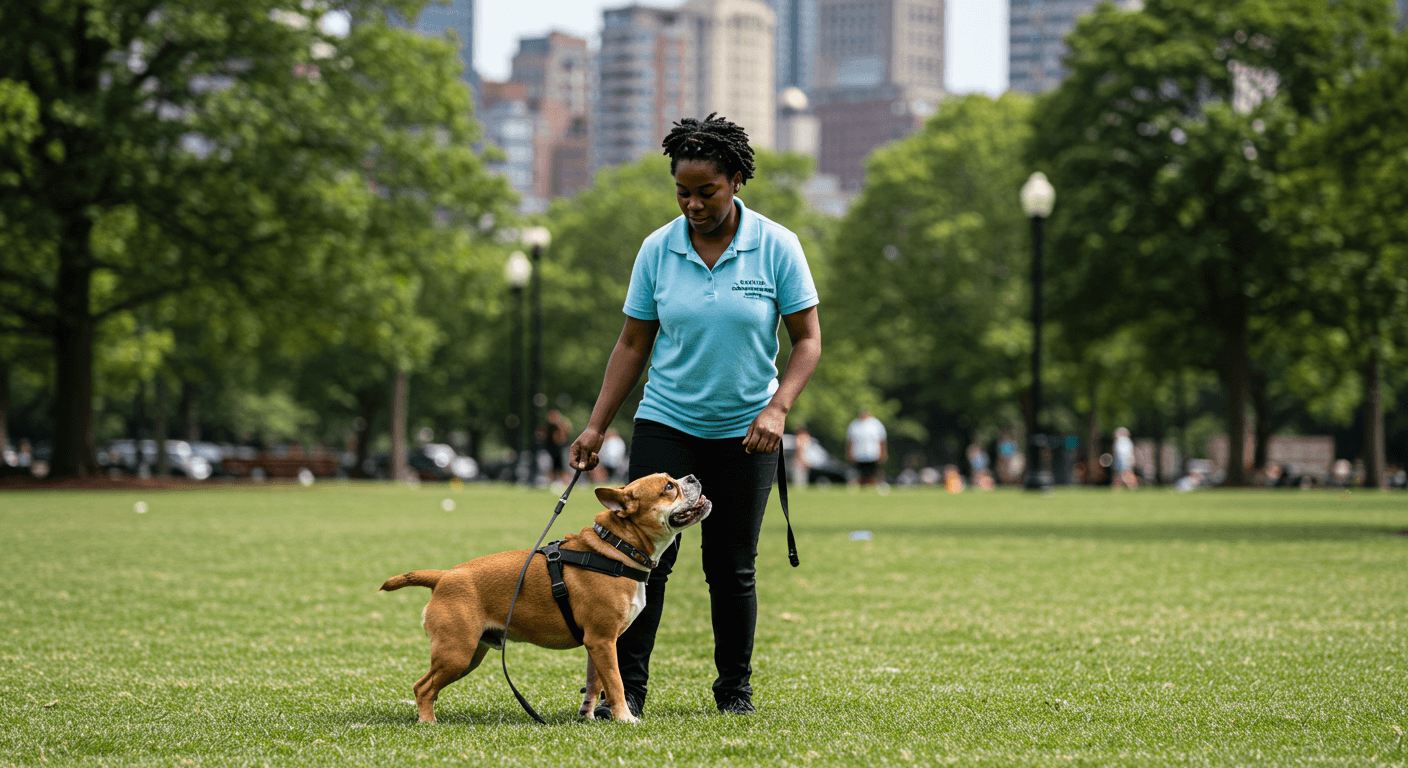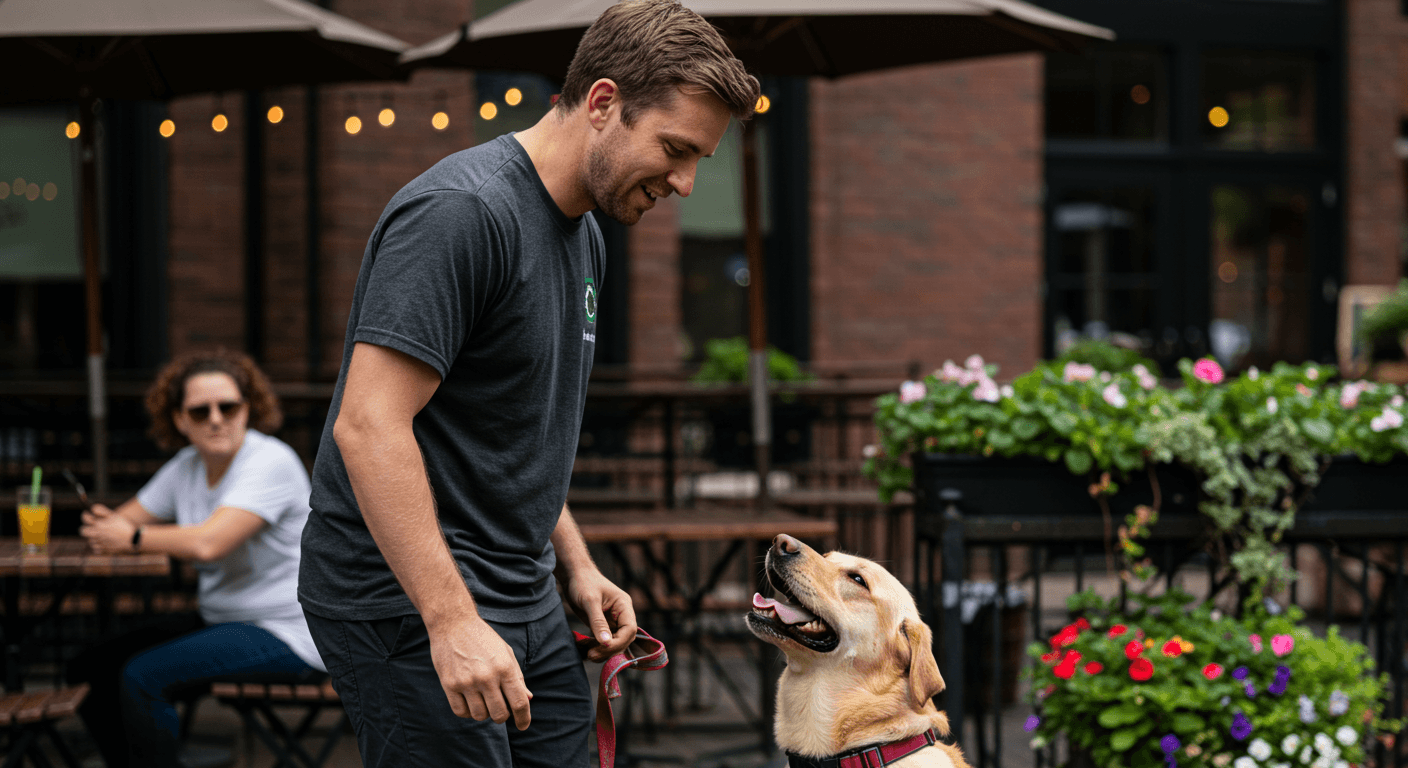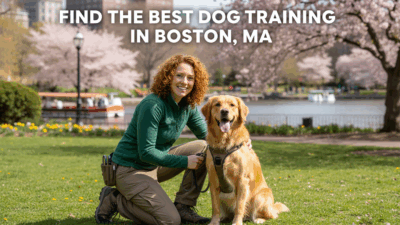Your Complete Guide to Choosing a Dog Trainer in Boston MA
Living with a dog in Boston means navigating crowded sidewalks in neighborhoods like Back Bay and Beacon Hill, managing tight apartment spaces, and teaching your dog to stay calm during Red Sox game days when the city fills with energy. Your dog needs to handle T station crowds, stay polite on the narrow sidewalks of the North End, and remain focused despite constant urban distractions.
Boston sits in Suffolk County, where city ordinances and state laws work together to keep public spaces safe for everyone. When you find a professional dog trainer who understands these local challenges, you’ll see faster progress both at home and around the city.
How to Choose the Right Trainer
Start by looking for someone who uses positive reinforcement training and can set realistic goals for your Boston lifestyle. This means your dog should learn to walk calmly through busy areas like the Public Garden, stay focused near outdoor dining patios, and handle close quarters with other dogs on narrow city sidewalks.
Credentials give you a quick way to compare trainers’ experience levels. Common dog trainer certifications include KPA-CTP, CPDT-KA, or IAABC-CDBC for behavior problems. If your dog has serious aggression issues, look for someone with CBCC-KA or a science-based program like CTC.
In-home dog training works especially well in Boston apartments where you need to address barking, separation anxiety, and door manners in your actual living space. Group classes make sense once your dog can focus around other dogs, especially before you try busy spots like the Esplanade or Copley Square.
Common Dog Training Methods Explained

Reward-based methods build the trust you want while creating lasting behavior changes. They also help you follow Boston’s rules about keeping dogs under control in public spaces.
Basic obedience covers sit, down, stay, place, recall, and leash training so your dog can handle walks, restaurant patios, and park visits without pulling or jumping on people. These skills matter even more in a dense city where personal space is limited.
Puppy training focuses on socialization, potty training, bite control, crate comfort, and early leash skills. Starting with short, positive training sessions prevents bad habits from forming, especially important when you’re raising a puppy in an apartment building with shared hallways and neighbors close by.
Behavior modification addresses fear, reactivity, resource guarding, or separation anxiety through careful desensitization and counterconditioning. For serious cases, ask if your trainer works with local veterinarians who understand urban dog stress.
Private lessons and in-home sessions let you customize everything around your daily routines, while board and train can speed up results when you’re short on time. Day training programs work well for Boston professionals who need help establishing routines while they’re at work.
Dog training classes help your dog practice good manners around other dogs and people. The best classes give dogs plenty of space, screen participants carefully, and teach calm behavior rather than just excitement.
Specialized training like therapy dog training or service dog training requires extra structure, public-access skills, and a very clear step-by-step training program. Boston’s busy environment actually provides excellent real-world testing grounds for these advanced skills.
Stay away from trainers who use fear, intimidation, or pain to get results. Humane methods are safer for everyone, easier to maintain long-term, and much better for keeping peace with your neighbors in close-quarters city living.
Average Cost of Dog Training in Boston MA (Updated for 2025)
Prices around Boston and Suffolk County tend to run higher than state averages, reflecting the city’s cost of living and the specialized skills needed for urban dog training. Here’s what most local pet owners are paying in 2025.
| Service Type | Average Cost (Boston/Suffolk County) |
|---|---|
| Puppy classes (4-6 weeks) | $200-$350 total |
| Group obedience classes (4-6 weeks) | $225-$400 total |
| Private lessons (60-90 min) | $150-$275 per session |
| In-home coaching packages (4-6 visits) | $650-$1,400 total |
| Day training (trainer works your dog + handoff) | $600-$1,200 per week |
| Behavior consult for reactivity/anxiety (initial) | $200-$350 |
| Board and train (2-4 weeks) | $3,000-$6,500 total |
You’ll probably pay extra travel fees for trainers who need to cross neighborhoods during rush hour, and expect higher rates for complex behavior work or overnight board and train programs.
Make sure you understand what’s included, how the trainer tracks progress, and whether they offer a free consultation or free evaluation before you sign up.
Questions to Ask a Potential Dog Trainer
- What training methods do you use, and how do you keep training sessions positive and low-stress?
- What credentials do you have, like KPA-CTP or CPDT-KA? Do you keep up with continuing education such as CPDT-KSA?
- How will you customize the training program for my dog’s specific needs and our Boston lifestyle?
- Do you offer in-home visits, dog training classes, or day training, and which approach fits my goals best?
- How will we measure my dog’s progress and know when to add more distractions?
- What are the total costs, including any travel fees for different Boston neighborhoods, and what’s your cancellation policy?
- Do you carry liability insurance, and can you show me proof?
- For behavior problems, will you work with my veterinarian if needed?
- What should I practice between our sessions to help my dog keep improving?
- Have you worked with dogs in apartment buildings or other tight urban spaces?
Local Boston Rules and Considerations
Boston enforces leash laws and nuisance rules to keep parks, sidewalks, and neighborhoods safe for everyone. Massachusetts state law adds requirements for vaccinations and rabies control.
Leashes are required in all public spaces except inside designated off-leash areas within dog parks. Keep a standard 6-foot leash with you for city sidewalks, the Harborwalk, and community events.
Massachusetts law requires current rabies vaccination for all dogs over six months old. You can get these through city clinics or your regular vet, and owners must have proof of vaccination available on request.
Boston’s noise ordinance covers excessive barking, which can create problems quickly in apartment buildings and dense neighborhoods. Work with your trainer on alert barking and separation anxiety before neighbors start complaining or filing formal complaints with the city.
Dogs must be licensed annually through the City of Boston. You’ll need proof of rabies vaccination and spay/neuter status to register. Licenses help reunite lost pets with owners and support animal control services.
Massachusetts doesn’t require special licenses for expert dog trainers, but if a business boards dogs for payment, the state’s Department of Agricultural Resources oversees kennel licensing requirements.
The city’s Animal Care and Control division handles lost pets, bite reports, and enforcement of local regulations. They’re located in Roslindale and provide resources for responsible pet ownership.
Local Boston Resources for Dog Owners
These spots give you great places to practice polite manners, work on recalls, and provide safe enrichment for your dog. Always follow the posted rules and etiquette guidelines.
- Peters Park Dog Run in the South End offers a fenced area with separate sections for small and large dogs, perfect for practicing socialization and recall work
- Joe Wex Dog Recreation Space along the Charles River Esplanade provides stunning water views and a good-sized fenced area for off-leash practice
- Boston Common Frog Pond area allows on-leash dogs and gives you excellent opportunities to practice focus around crowds, street performers, and tourists
- Commonwealth Avenue Mall offers wide, tree-lined paths perfect for leash training with moderate distractions
- Harborwalk provides miles of waterfront walking paths where your dog can practice calm behavior around joggers, cyclists, and waterfront activity

FAQs
How much does in-home dog training cost?
Most Boston trainers charge $150-$275 per in-home visit, with discounts available when you buy packages. Behavior problems typically start at the higher end of that range, and parking challenges in neighborhoods like Beacon Hill or the North End may add small travel fees.
Is in-home dog training worth it?
Absolutely, especially in Boston apartments where you’re working on problems exactly where they happen. Your trainer can fix door manners, jumping on guests, reactions to hallway sounds, and building-specific challenges right at home, then step outside to practice leash skills on your actual neighborhood sidewalks.
Can you pay someone to house train your dog?
Yes, many trainers offer puppy training programs that include potty training, crate routines, and daily schedules. Day training can speed up the process while teaching you how to maintain the progress, which helps a lot when you’re managing a puppy in a high-rise with limited outdoor access.
What is the 3-3-3 rule for dog training?
This is a helpful timeline for new or adopted dogs: expect about 3 days for your dog to decompress, 3 weeks to learn your routines, and 3 months to feel completely settled. Good training programs work with this natural adjustment period.
How long will it take to reach my training goals?
Most puppies and friendly adult dogs show solid progress within 4-8 weeks if you practice daily. Fear, reactivity, or separation anxiety typically requires several months of careful behavior modification with gradual increases in difficulty. Urban distractions in Boston can extend timelines compared to suburban settings.
What should I bring to group classes?
Pack a flat collar or harness, a 6-foot leash, high-value treats, water, and current vaccination records if your trainer requests them. Leave retractable leashes at home for safety reasons, especially important in Boston’s tight training spaces.
What’s the leash law in Boston?
Dogs must be leashed and under control in all public areas, except inside designated off-leash zones within city dog parks. Keep that 6-foot leash handy for sidewalks, the T, public buildings, and community events.
Do I need a dog license in Boston or Suffolk County?
Yes, Boston requires annual dog licenses for all dogs over six months old. You’ll need proof of current rabies vaccination and spay/neuter status to register through the City Clerk’s office. Failure to license your dog can result in fines.
What shots does my dog need in Suffolk County or Massachusetts?
Rabies vaccination is required throughout Massachusetts for all dogs over six months old. Your veterinarian may also recommend distemper-parvo combination vaccines and bordetella based on your dog’s lifestyle. Check state guidelines through the Massachusetts Department of Public Health.
Are dog trainers required to be licensed in Boston or Suffolk County or Massachusetts?
No special trainer licenses exist in Massachusetts for dog obedience training. Certified dog trainers follow normal business regulations, but if they offer board and train services, their facility may need to be licensed as a boarding kennel under state agricultural regulations.
Where can I practice off-leash recall?
Use fenced dog parks in Boston like Peters Park Dog Run, Joe Wex Dog Recreation Space, or Charlestown’s Shipyard Dog Park to keep things safe and legal. Try visiting during quieter hours when you’re starting out to help your dog build confidence.
Which dog parks allow training around Boston?
Peters Park Dog Run in the South End and Joe Wex Dog Recreation Space on the Esplanade both allow off-leash play within their fenced areas and work well for practicing recalls and socialization. Shipyard Dog Park in Charlestown offers harbor views and good space for training for dogs.
What beaches or trails allow dogs for training?
Boston’s Constitution Beach in East Boston allows leashed dogs during off-season months. For year-round options, the Harborwalk provides miles of waterfront paths perfect for leash training, and the Minuteman Bikeway just outside the city offers long stretches where you can practice focus around cyclists and joggers. Many Massachusetts state parks and beaches restrict dogs during summer months, so check current regulations before you go.
How do I help my dog handle apartment living?
Work with a trainer on crate training, sound desensitization, door manners, and elevator behavior. Boston apartment dogs need to stay calm during hallway encounters, handle building maintenance workers calmly, and learn quiet settling behaviors. Many Boston trainers specialize in urban apartment challenges.
What should I do if my dog is reactive on Boston sidewalks?
Start with a certified dog trainer who understands reactivity and behavior modification. Practice in quieter neighborhoods first, learn to create distance from triggers, and work on engagement exercises that keep your dog focused on you. Boston’s density makes reactivity training challenging, so professional help will speed up your progress significantly.
The right combination of thoughtful planning, humane methods, and consistent practice around Boston’s parks and neighborhoods will help your dog become a confident, well-behaved dog and companion. If credentials matter to you, don’t hesitate to ask about dog trainer certifications and how your trainer stays current with new techniques. With the right dog training services and regular practice, your top dog can thrive in this historic city.
